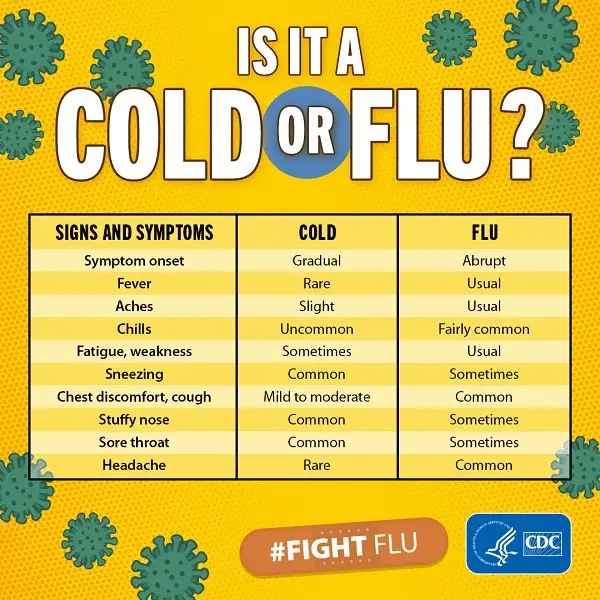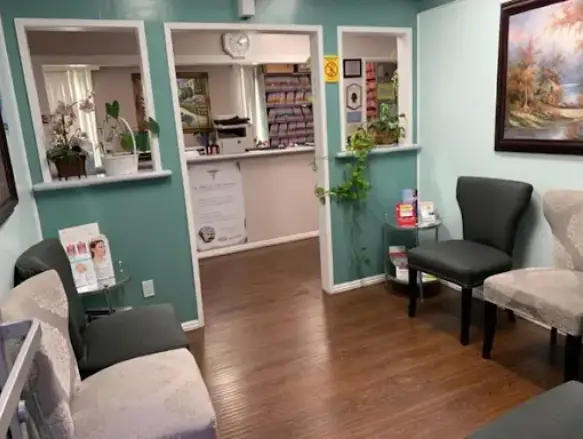Cold & FLU
Get In Touch
Call Now
Monday to Friday
9:00 AM To 6:00 PM
Saturday and Sunday
Closed

Flu and the common cold are both respiratory illnesses, but they are caused by different viruses. Because these two types of illnesses have similar symptoms, it can be difficult to tell the difference between them based on symptoms alone. In general, flu is worse than the common cold, and symptoms are more intense. Colds are usually milder than flu. People with colds are more likely to have a runny or stuffy nose. Colds generally do not result in serious health problems, such as pneumonia, bacterial infections, or hospitalizations. Flu can be very serious.
Because colds and flu share many symptoms, it can be difficult (or even impossible) to tell the difference between them based on symptoms alone. Special tests that usually must be done within the first few days of illness can tell if a person has the flu.
Flu Symptoms:
- fever or feeling feverish/chills,
- cough, sore throat, runny or stuffy nose,
- muscle or body aches,
- headaches and fatigue (tiredness).
Cold symptoms:
- Are usually milder than the symptoms of flu.
- People with colds are more likely to have a runny or stuffy nose.
- Colds generally do not result in serious health problems
Most viral respiratory infections, like the common cold, usually come and go within a few days, with no lasting effects. But influenza (flu) is a disease that can cause serious health problems and can result in hospitalization or death.
You can fight back by adopting healthy habits and by using medicines and vaccines approved by the U.S. Food and Drug Administration to combat and help prevent the flu.
- If you are generally healthy, here’s how to tell if you have a cold or the flu, and when to seek medical care.
- Flu and cold viruses spread mainly by droplets, when infected people cough, sneeze, or talk.
- You also can get infected by touching a surface or object that has flu viruses on it, such as a door handle, and then touching your eyes, nose, or mouth.
- Flu season in the United States may begin as early as October and can last as late as May, and generally peaks between December and February.
- Symptoms of colds usually are a stuffy or runny nose, sneezing, coughing, scratchy throat, and watery eyes. There is no vaccine to prevent colds.
- Symptoms of the flu come on suddenly and can include fever, headache, chills, dry cough, sore throat, body or muscle aches, tiredness, stuffy or runny nose, sneezing, and watery eyes
- Children younger than 5 years, but especially those younger than age 2
- Pregnant women
- People with certain chronic health conditions (such as asthma, diabetes, or heart or lung disease)
- People age 65 or older
- here are 17 rapid flu tests (11 antigen-based and six molecular-based) on the market with updated performance criteria that the FDA created to provide reasonable assurance that the test is accurate, reliable, and clinically valid.
- According to the Centers for Disease Control and Prevention’s flu testing guidelines, you don’t need testing — or to await test results — before your health care provider can prescribe antiviral medication.
Cold:
- Colds usually run their course. When you’re sick, limit exposing yourself to other people.
- Cover your mouth and nose when you cough or sneeze. Also, stay hydrated and rested.
- Avoid alcohol and caffeinated products.
Influenza
- There are FDA-approved prescription medications for treating flu.
- A cold or flu may lead to a bacterial infection (such as bronchitis, sinusitis, ear infections, and pneumonia) that could require antibiotics.
- Most people with the flu who aren’t at high risk have mild illness and do not need medical care or antiviral drugs. Still, your symptoms may last up to two weeks.
Nonprescription Medicines for Cold or Flu Symptoms
- Nasal decongestants help unclog a stuffy nose.
- Cough suppressants help relieve coughs.
- Expectorants help loosen mucus.
- Antihistamines help stop a runny nose and sneezing.
- Pain relievers can help ease fever, headaches, and minor aches.
- Get vaccinated against the flu. The best way to prevent the flu is by getting vaccinated every year. The vaccine changes each year and contains flu virus strains that are expected to be prevalent during the upcoming flu season.
- The protection from the previous year’s vaccine will diminish over time and may be too low to protect you into the next year, even if the flu virus strains circulating the next year are the same as those contained in the previous year’s vaccine.
- With rare exceptions, the CDC recommends that everyone ages 6 months and older should be vaccinated against flu. The flu vaccine provides protection from the flu and its potential complications, which can result in hospitalization and sometimes death.
- Annual vaccination is especially important for people at high risk for developing serious complications from flu: health care workers, and anyone who lives with or cares for people at high risk for serious flu-related complications.
- Although children younger than 6 months are too young to be vaccinated, they have the highest risk for being hospitalized because of flu and flu-related complications compared to children of other ages.
- Wash your hands often.
- Teach children to do the same.
- Both colds and flu can be passed through contaminated surfaces, including the hands.
- Wash hands with warm water and soap for at least 20 seconds.
- Try not to touch your eyes, nose, or mouth. Clean and disinfect frequently touched surfaces, especially when someone is ill.
- Limit exposure to infected people. Cover your nose and mouth with a tissue when you cough or sneeze. Throw the tissue in the trash after you use it
What Patients Say
Our Testimonials
Why patients trust Dr. Farah with their health

Came in with a headache and started to feel sick. Had a big trip for New Years, therefore I had to solve my problems quickly. Dr. Farah helped me right away and treated all my problems, he saved my weekend. Will come here again soon.
Melanie Warner

I was in a lot of pain and I walked in and the receptionist was so lovely. I was into see the doctor within five minutes and he listened to me and was wonderful. I’ve been to a few urgent cares and this one by far is the best !
Tiffany Lee-Frank

I absolutely love Dr Farah and his whole staff on the medical and the spa side. I’m not just saying this, Dr Farah has been my doctor over 10 years and I’ve been using his Rejuvenate spa for about 4 years now. I would give them 10 stars if I could!!!
Lori Brooks

Ashley and Anna are friendly and made me feel welcome and at ease. Dr. Farah was very understanding and answered all my stupid questions. They were all very professional and patient with me.
juli ross
Providing Urgent Care for non-life-threatening health complications

Urgent care services
Monday to Friday
9:00 AM To 6:00 PM
Saturday and Sunday
Closed
17130 Ventura Boulevard,
Encino California 91316






